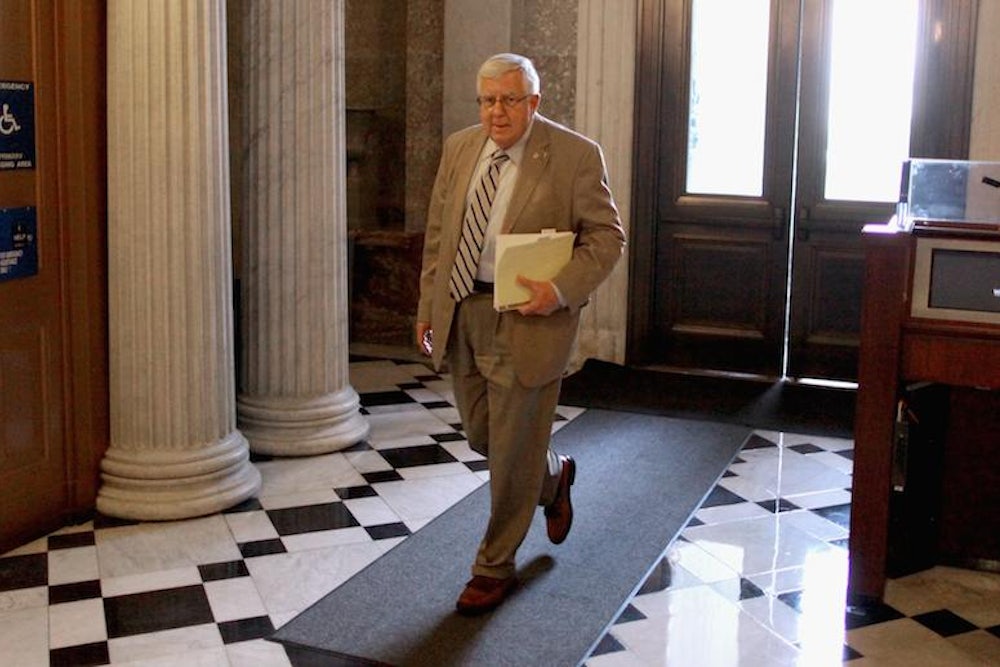Here’s a tip for conservative back-benchers looking to give their reputations a boost: get Liz Cheney to run against you.
Surely Mike Enzi, the Wyoming senator of 14 years, has never enjoyed a better week of press than the one he’s having right now, now that America’s most despised political scion has opted to primary him in 2014. The way that staid members of the political center have rushed to his defense, you would think that he was Joe Lieberman.
I don’t say that as a fan of Liz Cheney’s. Cheney is one of our most dishonest public interlocutors (see Conor Friedersdorf’s expert skewering here) and she totally bungled the last public service job she held, with the U.S. State Department. But just because Cheney is the worst species of partisan hack doesn’t mean that her target is a bastion of comity and compromise.
And yet that is exactly how Mike Enzi has been portrayed to us, implicitly and explicitly, in the past few days. Writing for the Washington Post, Dana Milbank notched widespread Republican support for Enzi as one of several signs that “the Senate may be recovering from its paralysis.” In a piece that makes you almost embarrassed for him, The Hill’s Brent Budowsky gushed, “Enzi is a serious man, a principled conservative, a senator of intelligence and substance, a gentleman of integrity. … Liz Cheney is a hothead rightist with a surplus of ambition.”
It’s easy to see why politicos might find this binary alluring. Stylistically, Cheney and Enzi are day and night. Cheney used her campaign announcement to promise even less bipartisanship than takes place today—“In my view, obstructing President Obama’s policies and his agenda isn’t actually obstruction. It’s patriotism”—and within the Beltway, actually admitting that you don’t care about compromise is a capital crime. By contrast, Enzi’s reply to the news that Cheney was running against him was almost darling: “I thought we were friends.”
But Mike Enzi, elder statesman? This is not an accurate picture of Wyoming’s senior senator. What Enzi is, on an average day, is a personally inoffensive, fairly ineffectual conservative nonentity. He may have, as John McCain suggests, a lot of legislative expertise. But for years, his vote has mainly been good for making sure that every meaningful piece of legislation to come before the Senate faces a filibuster. Put another way, his most consistent contribution to the senate is to ensure that on the business of governing, the senate has nothing to contribute. He is susceptible to the worst pressures of tea partyism; after voting to reauthorize the Violence Against Women Act twice in the past, in 2013, he bought into the canard that the latest version is unconstitutional. In fact, he is so unflinchingly right-wing—his lifetime rating from the American Conservative Union is 93 percent—that Brian Beutler almost has me convinced that Cheney, by comparison, is a lot more liberal. Enzi, what is more, has not engaged in a meaningful attempt at compromise since 2009, when he was a member of Max Baucus’s Gang of Six healthcare talks. Even then, it was not clear that he was participating in good faith; while talks were ongoing, he accused Democrats of attempting to ration health care.
Folks who are critical of Cheney, like Milbank and The Atlantic Wire’s Elspeth Reeve, are willing to concede that the difference between Enzi and Cheney is not ideological but “temperamental” (as Milbank put it.) And yet, somehow, the fact that Enzi produces about the same record that Cheney would, just more quietly, is mostly a nonissue to them.1 Reeve lamented that Cheney “wants six more years of nothing”—and just when the senate is becoming more bipartisan. As evidence, she cited the passage of immigration reform and the end of Republican filibusters against several of Obama’s executive nominations. Milbank argued that Republican support for Enzi was part of an encouraging trend that includes a bipartisan vote on the farm bill, and a compromise version of a student loan bill that failed in mid-July. Guess which Wyoming senator voted against all of those things?
The other knock against Cheney is that she didn’t enter the race with the kind of grace that is required of modern candidates for political office. Milbank was gratified to see the likes of John Barrasso and lone Wyoming Rep. Cynthia Lummis supporting Enzi, suggesting this was a sign of “a saner GOP.” But Barrasso doesn’t oppose Cheney for any good reason—she is, he says, “terrific, and I think she has a future that is very, very bright.” He just thinks she picked “the wrong race at the wrong time.” Lummis was more concerned that Cheney’s timing was “bad form,” a breach of Wyoming’s “great history of intraparty decorum,” than she was about Cheney’s actual politics. And of course, in Washington, transparent ambition is anathema. More Budowsy: “She disrespects the character and leadership it takes to be widely respected as a valuable senator, as Mike Enzi is. She disrespects the old-fashioned virtues of loyalty and friendship that should have inspired her to support Enzi because she is consumed by the ambition for power and publicity.”
Liz Cheney may not belong in the senate. But the fact that the difference between her style and Enzi’s has inspired so much handwringing is mystifying. I’ll grant that her knee-jerk opposition to finding common ground encapsulates part of what is so frustrating about the modern GOP, but you could say the same of Enzi. In fact, because he attracts praise for the “integrity” he projects while paralyzing the Senate at every opportunity, you could say that Enzi is the worse of the two. If Wyoming has to elect an uncompromising, right-wing politician next November, well, at least Senator Liz Cheney wouldn’t be fooling anyone.
Molly Redden is a staff writer with The New Republic. Follow her on Twitter @mtredden.
Even though later in his piece, Milbank knocks Cheney for going after Enzi on style, not on substance.
